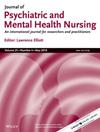Pregnancy in the shadow of psychosis: Navigating first-time motherhood with increased likelihood of postpartum psychosis and postnatal depression
Abstract
What is known on the subject?
- New parents who have previously experienced psychosis outside and/or following childbirth have an increased likelihood of experiencing an episode during the postpartum period.
- The decision to try to conceive can be agonising.
- Receiving care from a specialist perinatal community mental health team can improve outcomes.
What does this paper add to existing knowledge?
- This article offers a first-person insight into the steps the author took to minimise the impact of an episode of postpartum psychosis and/or postnatal depression whilst navigating new motherhood.
What are the implications for practice?
- This lived experience narrative aligns with the evidence base that demonstrates specialist perinatal community mental health services improve outcomes.
- It highlights the importance of maternity care providers asking about mental health history to identify any previous episodes or family history and offering referral to a specialist perinatal mental health service if available.
4.1 Introduction
Postpartum psychosis is a life-changing but treatable condition that usually occurs in the first few days to weeks after childbirth affecting 1–2 in 1000 pregnancies. Those who have experienced psychosis before, either as a single episode, related or unrelated to childbirth or as part of a long-term mental health condition have a higher likelihood of experiencing an episode in the postnatal period.
4.2 Aim
In this lived experience narrative the author shares personal experience of planning and navigating pregnancy with a higher likelihood of experiencing postpartum psychosis and postnatal depression around this major life transition due to previous episodes.
4.3 Methods
The author utilises a first-person approach to share and reflect on her lived experience.
4.4 Findings
The author shares her experience of receiving care and some of the steps she took to try to manage the impact of pregnancy and birth on her mental health during this major life transition. She describes how care from a specialist perinatal community mental health team and peer support contributed significantly to her family's well-being.
4.5 Discussion
Specialist perinatal community mental health services can improve outcomes for those with a higher likelihood of experiencing postpartum psychosis and postnatal depression by facilitating planning and mitigating some of the risks that could lead to relapse in the perinatal period.

 求助内容:
求助内容: 应助结果提醒方式:
应助结果提醒方式:


